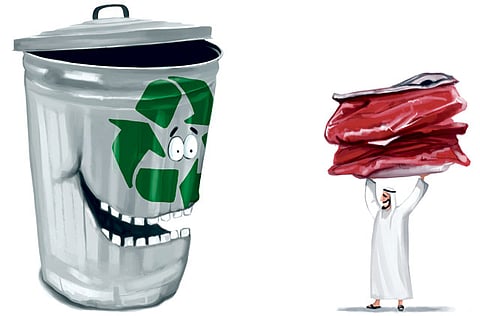GCC should implement principle of zero waste
The idea is to encourage the redesign of the resource lifecycle so that all products are reused and will eventually result in more profits for the companies

Growing population and high levels of urbanisation have increased the demand for urban services in the Arabian Gulf region, including solid waste management. Further, owing to acceleration in the pace of industrialisation, the generation of hazardous and non-hazardous industrial wastes and biomedical waste has increased.
Waste generation rates are affected by socio-economic development, degree of industrialisation, and climate change. Generally, the greater the economic prosperity and the higher the percentage of urban population, the greater the amount of solid waste produced.
It is worth mentioning that the unique characteristic of the Gulf Cooperation Council (GCC) countries is the constant change in the expatriate population from year to year. Each year, a significant percentage of the expatriate population in the region is replaced by another group resulting in change in generation and the mix of urban solid waste. As a result, the solid waste information of only a few years ago may no longer represent the picture of household solid waste at the present time. This requires waste management system capable of handling fluctuating waste — both in terms of quantity and composition.
Municipalities are responsible for waste management in the GCC countries. Most of the municipalities have general regulations and rules for management and disposal of solid waste along with programmes to reduce the amount of the solid waste generated. They have also established landfill sites, hazardous waste management plants, and recycling units. At state level, there are legislations in place for waste management.
In fact, locally, regionally and globally, there have been many initiatives and technologies to deal with waste issue. The establishment of an integrated waste management programme is a must. The traditional solution was the disposal in landfills. Unfortunately, not all landfill were designed in eco-friendly ways that avoids leakage in the future. Beside, the high associated costs and land use requirements.
Main problems
Another good solution is composting as an alternative for Municipal Solid Waste treatment. However, a large number of composting plants in the region have not worked well. The main problems with most composting facilities are adverse climatic conditions, high operating and maintenance costs, lack of technical support, and inefficient management.
Recycling is still very limited and the only comprehensive form of recycling in the GCC countries has been in the case of paper and cartons, metals and cans. Although some GCC states have placed recycling at the top of their waste management priorities, the low cost of landfill and the availability of land, usually old quarries, make recycling programmes uneconomical.
But, the important question, do we really need to keep creating waste? Why do we not resemble nature? The Earth is full of creatures and many processes of life cycles. So, the thinking has changed and many new concepts like ‘circular economy' have emerged. It is an economy in which the waste from one production/consumption process is circulated as a new input into the same or a different process.
As a result of the circular economy concept, a very important principle of zero waste is being adopted in many countries nowadays. The idea is to encourage the redesign of the resource lifecycle so that all products are reused.
Consequently, many producers are responsible for their products even after the product life comes to an end. It is not like it used to be, produce and produce without care for nature and impact at the end of the product life time. The consumer has to return the product to the producer again for reuse, repair or recycling back into nature or the marketplace.
The importance of this idea is that the producer is not only concerned about producing more and making profit but he also has to take into consideration the material he uses in his product.
It has to be easy to recycle and therefore this would spur more research in this area. This eventually will result in more profit in the long term for such companies as in many cases they will not have to look for more material for the new product. They would simply get most of it from the returned products and/or in some cases they would just have to change one part of their returned products to make it fully functional again.
At the same time, this will result in reducing burden on municipalities and private companies that gather and recycle waste. It is clearly a better solution than incineration that causes emissions and needs a continuous feed from waste to keep the process running, thus encouraging more unsustainable production.
This concept is applied now by many companies which are setting up producing landfill-free plants. These companies include General Motors, Subaru, Toyota, Xerox, Wal-Mart, Nike, Ford and others in countries such as Australia, New Zealand, the US, Brazil, the UK, Germany, and Norway, besides GCC countries.
Without doubt, the status quo is not acceptable and zero waste is undoubtedly a win-win situation for all parties.
Dr Mohammad Abdul Raouf is in charge of environment research at the Gulf Research Centre, Dubai.

